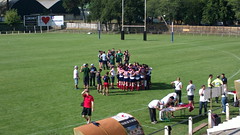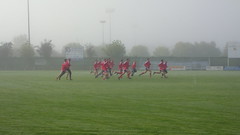The third best performed team at Euro Cup 2012 was England. For one half of football, Norway kept them goalless. Runners up Denmark should have won the whole tournament. Against Norway, they were forced to play catch-up football after conceding the first goal of the game and struggling to find their rhythm.
The best teams in Europe have played 9-a-side football for years, and their squads are packed with international cup players, players with club football experience in Australia and guys who get regular match practice in the hardest competitions in the continent. Just a few years ago in Norway, we had a handful of enthusiastic people and three footballs.
By overpowering Austria and Iceland and earning the full respect of England, Denmark and Scotland, Norway not only won the plate championship of Euro Cup 2012 – it announced it had the players and the plans to be a future force in Australian football.
Opponents, onlookers and even the world’s most read AFL newspaper were unanimous in their praise.
The team earned this respect by playing with tremendous heart. Their effort and workrate was strong, their courage and commitment to the contest was excellent, and their skills mostly stood up to the test of international competition.
Three very tough group opponents ended up being the best thing that could have happened to the team. Playing strong opposition sometimes forces you to find a way to lift your game, and get to a higher standard. This is exactly what happened.
Team Norway literally improved with every minute and every contest of the group games. It was immediately obvious that the pace and physicality of Euro Cup was a couple of levels above the (fantastic) local Kenguru Cup games. Two things can happen when faced with this increased pressure, speed and intensity – a team either wilts and gets crushed, or they compete harder and faster, and work upwards towards the level of the other team.
Every Norwegian player should be proud that they responded to the challenge so emphatically. Denmark, England and Scotland had to work hard to win the ball, had to work hard to score, had to rely on the little tricks they know from playing much more football. The Norwegian team didn’t let them have an easy ride. The scores absolutely did not represent how competitive Norway really was.
Of course there were little patches where the inexperience showed. Every now and then things fell to pieces, or the skill-level let down a great passage of play (accuracy in front of goal is still lacking). This is unavoidable for such an inexperienced team, and the reason the scoreboard ticked over as much as it did for the other teams. But any spectator who was at the game and then saw those scores would have been surprised. Surprised that Norway was not closer, given how competitive they were during the game.
The tough lessons and the self-belief that came from being so competitive against the best teams meant good things for the plate playoff games. Austria, another nation with relative inexperience, had been having a very tough day. Whispers were going around the tournament that Norway were in fact hot favourites to beat Austria, despite being tournament rookies and never having won a game in an international tournament.
The whispers proved accurate. Norway wanted the ball more, worked harder, and had greater skill. Right from the start, the Trolls showed that they had already come far enough to be able to comprehensively outpoint the likes of Austria. The win was a great moment, and you could see how much the team enjoyed being able to outplay, out-compete and outscore an international team.
After four tough games of football, a plate final awaited. Iceland and the Czech Republic played out a tough, physical game for the right to face Norway, and the Icelanders got over the line.
On the main oval, in front of a decent crowd, the final would be Norway’s. The team workrate that had been so great all day stayed high. The skills and teamwork remained solid, and the experience of the day made for smarter football and better decision making. In the end the victory was comprehensive – almost bigger than the whitewash over Austria.
A plate presentation, a speech through a megaphone, some team photos and it was over. A hugely successful debut that taught Norway it is good enough to compete at this level, and also showed what it takes to be at the top of the region. The extremely high standard of the final demonstrated how good football can be in Europe, and the skills, athleticism and hardness that will need to be developed in Oslo, Ås and elsewhere before next tournament.
Playing so well, watching the final over a few beers, heading out together and sharing the weekend together made this group into a team, and showed some of the newer guys something Adam and I have known all along – that this is a game that tests you, makes teammates into actual mates, and can give you satisfaction and enjoyment that no other game can. AFL Europe is doing a fantastic job – stick with this game and there can be more great weekends like Edinburgh.
Congratulations to all of you. Thanks to everyone who has contributed to football in Norway in 2012. Everyone who has coached, played, volunteered, cooked hot dogs, umpired or otherwise been part of this fantastic first tournament. Enormous thanks to Anette Smith for continuing her phenomenal service to the team.
2013 is going to be big.
Stoney
Euro Cup player notes
Eivind Myrvold (c) – Justified his selection as captain by being uncompromisingly tough at the ball and the man. Showed great ball winning ability, skill and leadership. A great tournament.
Lars Konrad Hansen (vc) – Versatile, tough and team oriented. Won more and more of the ball as the day went on, and took on a range of tough assigments. His accountable, positive defensive play in the final was telling. Fantastic effort.
Rene Damborg Jensen (on-field coach) – Our most experienced international player showed exactly why he is still so highly regarded. Does all of the things really good footballers do. Gets the hard ball, uses it well, tackles ferociously and kicks goals. Set the tone in the final, and did hist host country proud all day.
Atle Mengshoel-Brevik – Boy am I glad we tried him at fullback in one of those Kenguru Cup games. Super super defender. Rarely gets beaten in a marking contest, has brilliant defensive instincts and judgement. Saved countless goals, and was rock solid kicking in. One of our best on the day.
Anders Thømt – Ås’ quiet achiever has just gotten better and better all year, and the Euro Cup was another very big step in his improvement as a player. Turned in a superb performance against Austria. Ended up with several goals and some really strong work in the midfield.
Andre Halse Klaffmo – Did everything that was asked of him. Worked really hard all day, and got the rewards for his effort. Did a great job of getting his body behind the ball and not letting the ball or his opponent get past him. Has improved out of sight since the start of the season.
Andreas Kristoffer Berge – One of Norway’s most important players. Still runs further than any other forward, and has added some additional toughness to his game. His effort in the final was enormous. Ended up with four goals.
Brage Blomdal – Norway’s first ever goal kicker in an international tournament. Strong and versatile, he did some excellent work down back when the team needed it, made some good ruck contests and was a dangerous forward too.
Tobias Dalgaard Limseth – Tough at the ball and the man as expected, and unlucky not to end up with a goal in the final. Will add some stability and consistency to his game in 2013 and be an absolute force.
Kim Orderud – Perhaps the most improved of any Norwegian player. Strong enough to handle big bodied midfielders and to break through tackles, he gave the team drive. by the time the final came, he was also judging the ball well in the air and taking marks around the ground. Did a great job.
Just Andre Michaelsen – His obvious strength is his ruckwork, which was very good all day. Was strong at the ball – so strong that he beat someone to the ball, picked it up and watched as his opponent bounced off him and almost knocked himself out. Was dangerous up forward without ever completely breaking loose. Hopefully we will see more big games from him next year.
Klas Alexander Harris – Didn’t stop working or committing to the ball at any point. Showed his teammates the rewards for getting to the ball first. Has a good football brain (judgement, reading the ball and the play), and rarely gets beaten one on one. Should be really proud of his contribution.
Ludvig Hedberg – Responded to his ‘demotion’ into the backline with the best football we’ve ever seen him produce. Simply tore the Austria game apart. Soaked up some hard physical pressure and did everything that was asked of him.
Morten Aulund – Was using his pace and his strength at the ball to great effect before his unfortunate muscle strain. Showed real courage when Englad tried to intimidate him. Contributed really well on the day, and deserved to play in the wins. Has great potential.
Fritjoff Denneche – Can ruck a little, take a mark, and has nice quick, clean handballing skills. He also did some brilliant team lifting defensive things, namely strong tackling, smothering the ball and shepherding. Played a really important part for the team.















[…] hans oppsummering av EM på klubbens hjemmesider HER. (Obs! på […]